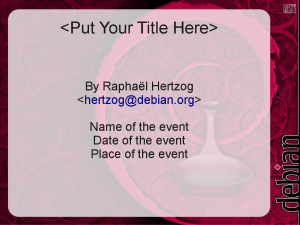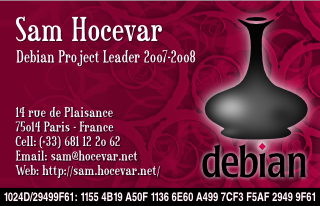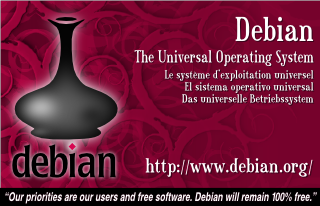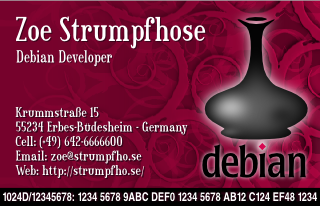 Tim
Tim pointed out that it's worth travelling simply for the new timezone in your
debian/changelog entries.
We can use
AptFs to work out who has collected the most so far:
import os
import glob
import itertools
import collections
from dateutil.parser import parse
from debian.changelog import Changelog
data = collections.defaultdict(set)
for package in glob.glob('/apt/*'):
if os.path.islink(package):
continue # Consider source packages only
try:
changelog = Changelog(open('%s/debian/changelog' % package))
except:
continue # Ignore invalid changelogs
for entry in changelog:
try:
data[entry.author].add(parse(entry.date).strftime('%z'))
except ValueError:
pass # Ignore invalid dates
fn = lambda x: len(x[1])
top = sorted(data.items(), key=fn, reverse=True)
for k, g in itertools.groupby(top, key=fn):
print "\n%d timezone(s):" % k
for author, timezones in sorted(g):
print " * %s (%s)" % (
author.encode('utf8', 'ignore'),
', '.join(sorted(timezones, reverse=True)),
)
14 timezone(s):
* Bdale Garbee <bdale@gag.com> (-0800, -0700, -0600, -0500, -0400, -0300,
+1300, +1100, +1030, +0900, +0300, +0200, +0100, +0000)
12 timezone(s):
* Joey Hess <joeyh@debian.org> (-1000, -0900, -0800, -0700, -0500, -0400,
-0300, -0200, +0300, +0200, +0100, +0000)
11 timezone(s):
* Paul Wise <pabs@debian.org> (-0400, -0300, +1300, +1100, +1000, +0930,
+0900, +0800, +0200, +0100, +0000)
9 timezone(s):
* Barak A. Pearlmutter <bap@debian.org> (-0700, -0600, -0500, -0400, +0500,
+0300, +0200, +0100, +0000)
* Martin Michlmayr <tbm@cyrius.com> (-1000, -0700, -0300, +1100, +1000,
+0300, +0200, +0100, +0000)
* Martin Pitt <mpitt@debian.org> (-0800, -0700, -0600, -0500, -0400, +0300,
+0200, +0100, +0000)
* Sam Hocevar (Debian packages) <sam+deb@zoy.org> (-0700, -0500, -0400, -0300,
+0930, +0300, +0200, +0100, +0000)
Full output.
However, something tells me we aren't going to see widespread gamification of Debian development.
 Many people worked on finishing DEP 5. I think that the blog of
Lars does not show enough how collective
the effort was.
Looking in the specification's
text,
one finds:
Many people worked on finishing DEP 5. I think that the blog of
Lars does not show enough how collective
the effort was.
Looking in the specification's
text,
one finds:

 Out of curiosity, and because it is Sunday morning and I have a cold and
can't get my brain to do anything tricky, I counted the number of
candidates in each year's DPL elections.
Out of curiosity, and because it is Sunday morning and I have a cold and
can't get my brain to do anything tricky, I counted the number of
candidates in each year's DPL elections.



 Today, the Internet will be full of bullshit.
Today, the Internet will be full of bullshit.
 (long post, you've been warned)
With his
(long post, you've been warned)
With his  Even if i don't like talking about this in public,
Even if i don't like talking about this in public, 


 I don t know enough about SVG scripting and object cloning, so to do
the text shadow you will have to edit the same object twice. Sorry about
that. Here are the files:
I don t know enough about SVG scripting and object cloning, so to do
the text shadow you will have to edit the same object twice. Sorry about
that. Here are the files:
